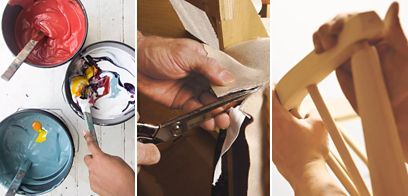Our Craftspeople
Haddy
This small team of engineers changed lanes to design the furniture of the future.

Haddy engineers calibrate a 3D printer.
In 2007, John Rogers founded Local Motors, a company that would go on to create the world’s first 3D-printed car. Throughout their journey in the world of 3D printing, John and his friends enjoyed using their free time to print things like skateboards, cricket bats and bookcases. Soon enough, the group realized 3D-printing furniture had become their true passion. In 2020, the team formed Haddy, a company entirely dedicated to 3D-printing modern furniture.

Haddy craftspeople meet in their microfactory.
Haddy is located in St. Petersburg, Florida, where their small team operates an advanced set of robots that can print almost any shape. 3D printing technology introduces the exciting possibility of new forms in furniture that just weren’t possible with traditional materials. Room & Board Merchandising & Design Manager Brian Linehan shares, “In the past, people have combined new materials and new technology to challenge the way furniture is produced and the way it looks, like during the Bauhaus design movement. We believe 3D-printed furniture is one of these new frontiers.”

A 3D printer dispenses PETG composite to form a table.
The material Haddy uses to create 3D-printed furniture is glycol-modified polyethylene terephthalate (PETG) which is combined with silica fibers and dyes to form a highly durable and color-fast material called PETG composite. Because PETG composite is infinitely recyclable, Haddy can repurpose every scrap from the manufacturing process back into new furniture. What’s more, industrial recycling programs or Haddy themselves can take entire pieces and recycle these back into brand new furniture. This makes Haddy items circular products since their materials can be reused repeatedly—a promising advancement for sustainable furniture.
